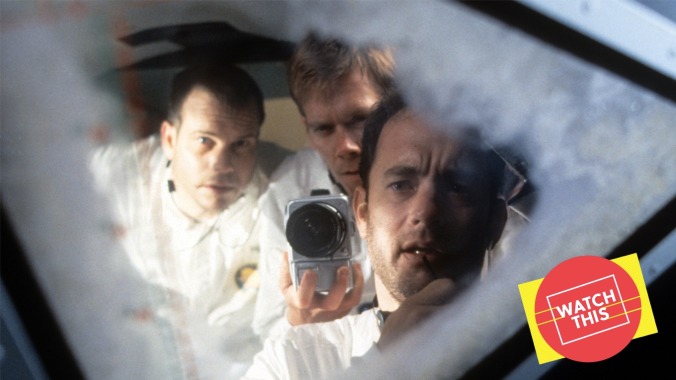Forget the moon landing—Apollo 13 proves that botched missions are the ones to dramatize

Watch This offers movie recommendations inspired by new releases, premieres, current events, or occasionally just our own inscrutable whims. This week: With Voyagers now in theaters and Stowaway on Netflix next week, we’re looking to the stars for five days of space movies.
Apollo 13 (1995)
Imagine hopping into a time machine, traveling back to mid-July of 1969, stopping by NASA, and telling folks there that half a century later, there still won’t be a big-budget Hollywood movie about humanity first setting foot on the moon (only a TV miniseries, which wouldn’t sound remotely prestigious three years before HBO even launched, and a Neil Armstrong biopic), but that there will be a popular, Oscar-winning movie about the third attempt to travel there. Actually, the word “attempt” alone would likely inspire sufficient alarm to alter the course of history, saving everyone a lot of anxiety and hassle, albeit at the cost of depriving the world (or perhaps some alternate/parallel universe) of a terrific film. For while Apollo 13 was a doomed mission, Apollo 13—directed by the kid who just finished playing Opie Taylor, you inform the ’69ers, ensuring that they’ll dismiss your entire crazy story—exemplifies studio filmmaking at its finest, throwing money, talent, and craft at the problem in much the same way that NASA worked collectively to save its astronauts.
It helps to be dramatizing a real-life event so legitimately harrowing that precious little needed to be invented for entertainment’s sake. Just two days prior to launch, Command Module Pilot Ken Mattingly (Gary Sinise) was grounded, after it was discovered that he’d potentially been exposed to rubella, a.k.a. German measles; were he to become sick, it would likely be exactly when his expertise was most needed. So he was replaced at the last minute by backup pilot Jack Swigert (Kevin Bacon), with whom the other two astronauts—Jim Lovell (Tom Hanks) and Fred Haise (Bill Paxton)—had never worked. As fate would have it, Swigert was the one instructed by NASA, as Apollo 13 neared the moon, to perform a routine stir of the oxygen tanks, causing (for reasons then unknown) an explosion that not only necessitated aborting the planned lunar landing, but spewed most of the command module’s remaining oxygen into space. To get home, the astronauts had to move to the lunar module, which wasn’t designed to sustain three men at all, much less three men for several days. Cue a mad scramble at NASA, with one of the two flight directors, Gene Kranz (Ed Harris), orchestrating a remarkable ultra-long-distance survival plan.
Apollo 13 has its share of poignant moments, with Hanks putting his all into Lovell’s quietly crushed reaction when Mission Control sends an instruction that will kill any chance of their landing on the moon. For the most part, though, this is a superlative problem-solving narrative—not unlike the stirring effort that brings Matt Damon’s stranded astronaut home in The Martian, except that this actually happened. Arguably, the film’s most emblematic line is delivered not by any of its stars but by the anonymous NASA tech who dumps a bunch of random crap onto a table, holds up a square filter and a cylindrical filter, and tells his assembled team, “We need to make this fit into the hole for this using nothing but that.” (The astronauts were in danger of being suffocated by their own expelled carbon dioxide, and the only filters available were constructed for the wrong module.) Every possible variable is critical, with experts at one point bewildered by their calculations seeming slightly but crucially off… until they realize that they’d expected the return to be heavier by roughly 200 pounds of moon rocks that never got collected.
Watching these men—the complete absence of women in Mission Control, while historically accurate, now seems very bizarre—improvise multiple solutions to a crisis unfolding tens of thousands of miles away from Earth instills pride, not just in America but in Homo sapiens generally. Maybe it makes sense, after all: Why make a movie about the time everything went right, when it’s just as inspiring, and even more exciting, to chronicle how we rose to the occasion when virtually everything went wrong?
Availability: Apollo 13 is currently streaming on Peacock. It’s also available to rent or purchase digitally from Amazon, Google Play, Apple, YouTube, Fandango Now, Redbox, AMC On Demand, DirecTV, and VUDU.